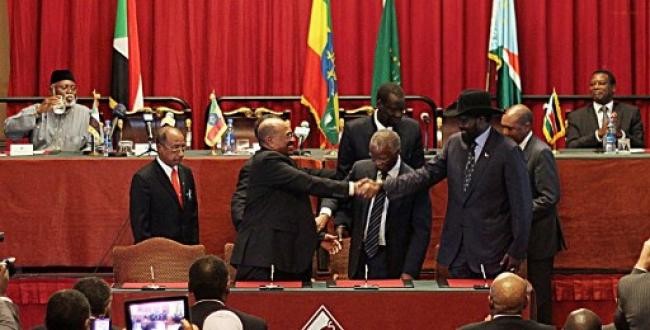Sudan and South Sudan agreed 27 September to restore the pension rights of South Sudanese public servants who were dismissed from service as a consequence of new rules associated with nationality. They also agreed to restore the rights of a smaller number of northerners who had worked for the regional southern government (GOSS). Signed by the chief negotiators Idriss Abdel Gadir and Pagan Amum Okiech, the ‘Framework Agreement to Facilitate Payment of Post Service Benefits’ was part of a package of deals negotiated in Bahir Dar and Addis Ababa in Ethiopia under the mediation of the African Union.
Excerpt: “The Republic of Sudan acknowledges its duty to pay Post-Service Benefits and hereby commits to pay all Post-Service Benefits, including pensions and gratuities and other payments due to eligible and vested current and former Public Servants of the Republic of Sudan and their survivors at the central, state or local levels, including Public Servants who have become citizens of the Republic of South Sudan…”
Background: Public service sector employment has always been an important part of Sudanese society, particularly since the 1970s when the President Jaafar Nimeiri pursued socialist policies that expanded the role of the state. In spite of the civil war in the south, many urban southerners in particular held jobs in government garrison towns or migrated north where they sought employment in state-owned industries, hospitals, schools or other institutions. A huge number of southerners also served in the national armed forces, state-level police services or other security organs. After secession in July 2011, these individuals were stripped of their citizenship, dismissed from work and disbarred of their pensions.
Implications: The two countries will establish a joint ministerial committee on pensions and a joint technical committee to determine who will be eligible for pensions and to ensure transfer of arrears payments and regular payments through the central banks to the countries’ respective pension funds. The International Labour Organization will support these committees, and will be the arbiter of disputes among the ministers.
Not to be confused…: Although the agreement deals mainly with administrative matters for pensions systems, the political stakes are extremely high. The agreement defines ‘pensioner’ to include former soldiers. Ensuring payment of pensions to former soldiers – and commanders – poses particular challenges, given that during the long civil war a particular individual may have had multiple loyalties, or may lack documentation about the term of his service.
See also:
Explaining the Addis Agreements: Oil Fees
Explaining the Addis Agreements: Border Demarcation
Explaining the Addis Agreements: Border Monitoring



